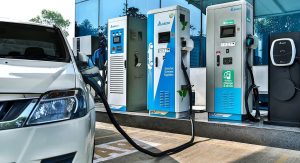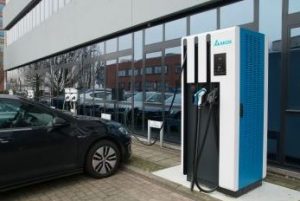Recognizing the transformative potential of electric vehicles (EVs) in the country, Delta Electronics India has actively promoted e-mobility by delivering over 10,000 EV chargers nationwide, contributing significantly to the country’s EV charging infrastructure, says Manjula Girish, Business Head-EV Charging & Photo Voltaic Inverter Division, Delta Electronics India in an interview with Anurima Mondal, Editor of EVolution Auto India.

Q: Please walk us through the business journey of Delta Electronics along with its crucial milestones.
Manjula Girish: At Delta Electronics India, we take pride in our journey as a leading provider of power and energy management solutions. Since our establishment in 2003, we have grown alongside India’s dynamic technological landscape, marking several pivotal milestones that underscore our commitment to the market.
We began by acquiring ASCOM in 2003, a global leader in networking and telecom solutions, solidifying our foothold in India’s burgeoning telecom sector and establishing ourselves as a reliable supplier of telecom power solutions. Over the years, we expanded our portfolio to encompass power electronics, UPS systems, display solutions, and industrial automation products, catering comprehensively to diverse industry needs.
Through relentless innovation and a steadfast commitment to quality, we have emerged as a market leader across various segments, including Telecom Power Solutions, Renewable Energy Solutions, Display Solutions, and Industrial Automation Solutions.
At Delta, sustainability is at the heart of our operations. We are global pioneers in sustainable practices, and in India, we offer energy-efficient solutions that help businesses reduce their environmental impact. Our commitment to sustainability is further exemplified by our membership in RE100 and our ambitious goals to achieve 100 percent renewable electricity and carbon neutrality by 2030.
Recognizing the transformative potential of electric vehicles (EVs) in India, we have actively promoted e-mobility by delivering over 10,000 EV chargers nationwide, contributing significantly to the country’s EV charging infrastructure.
Looking forward, innovation and collaboration remain central to our strategy. We continue to invest in research and development, nurturing a culture of continuous improvement. With a robust network of regional offices, manufacturing facilities, and channel partners, we are well-positioned to serve our clients across India effectively.
Our journey in India is ongoing, driven by a commitment to innovation, efficiency, and sustainability. We are dedicated to exploring new opportunities that contribute to India’s technological advancement and sustainable growth. By staying true to our core values, we aim to uphold our reputation as a trusted partner for businesses in India and beyond.
Q: Could you shed some light on the comprehensive suite of EV charging solutions provided by Delta Electronics along with its energy-efficient technologies?

Manjula Girish: Delta Electronics leverages over 50 years of expertise in power technologies to deliver a comprehensive suite of energy-efficient EV charging solutions. Our portfolio includes advanced AC EV chargers, high-speed DC Fast chargers, and a user friendly Site Management System, all designed to provide optimal power efficiency and seamless integration.
Delta’s EV chargers are renowned for their high-performance efficiency and robust communication functions, ensuring easy integration into various systems. Our products have obtained global safety certifications such as UL, IEC, CHAdeMO, CQC, CNS, and ARAI/ICAT, affirming our commitment to safety and reliability.
Our EV charging solutions cater to a wide range of applications, including parking facilities, workplaces, fleet operations, and residential buildings. Delta has successfully completed numerous installations worldwide, demonstrating our ability to meet the diverse needs of different sectors. By providing energy-efficient and sustainable EV charging infrastructure, Delta Electronics is playing a pivotal role in advancing the e-mobility landscape globally
Q: As a tech enthusiast, how has your journey been in the EV charging industry? What are your long-term goals?
Manjula Girish: As a tech enthusiast, my journey in the EV charging industry has been both exciting and transformative. Being part of a rapidly evolving sector, I’ve had the opportunity to witness and contribute to the development of cutting-edge technologies that are shaping the future of transportation. The challenge of creating efficient, reliable, and scalable EV charging solutions has been incredibly rewarding.
One of the most fulfilling aspects of this journey has been working with a team of innovative thinkers and engineers who share a passion for sustainability and technological advancement. Together, we’ve tackled complex problems, pushing the boundaries of what’s possible in the realm of power and energy management.
Looking ahead, my long-term goals are centered around further advancing EV charging technology and infrastructure. I aim to focus on enhancing the efficiency and accessibility of EV chargers, ensuring they are more user-friendly and seamlessly integrated into various applications. Additionally, I am committed to supporting the transition to renewable energy sources, making EV charging not only a convenient choice but also an environmentally responsible one. By driving innovation and fostering collaboration within the industry, I hope to contribute to a more sustainable and electrified future.
Q: What are the challenges for EV charging infrastructure in India?
Manjula Girish: The development of EV charging infrastructure in India faces several significant challenges. One major concern is the projection of cash flows for charging stations. Financial institutions often find it difficult to evaluate the potential return on investment due to limited utilization of chargers. This challenge is compounded by the large initial outflows required, including capital expenditure, grid connection costs, energy costs, debt servicing, land fees, and ongoing operations and maintenance expenses. The projected cash inflows are highly dependent on assumptions about the growth rate of EV adoption, which are influenced by state and national policies, the availability of vehicle models, consumer awareness, and the emergence of sustainable charging business models.
Several specific issues exacerbate these challenges. The lack of connector standardization, the absence of common APIs for mapping charging infrastructure across the country, and the reliance on telecom providers for connectivity all contribute to inefficiencies. Additionally, problems with discom infrastructure, such as power outages, voltage fluctuations, and the lack of net metering, hinder the reliability of charging stations.
Land ownership uncertainty further complicates the situation. Often, the land parcels intended for EV charging installations are publicly owned, and their usage rights can be unclear or subject to change, posing risks for long-term investments. Establishing public charging infrastructure is a daunting and expensive proposition, involving disruptions to congested travel corridors, securing suitable charging spaces, and making substantial financial outlays to build a comprehensive network.
Another significant challenge is the lack of support for grid development to handle the increased load from EVs. Industry analyses predict that the increased use of EVs by 2030 will drive electricity demand up by 100 TWh, necessitating substantial upgrades to the grid.
Overall, these challenges highlight the need for coordinated efforts between government, industry stakeholders, and financial institutions to develop standardized, reliable, and scalable EV charging infrastructure in India- it’s a collective effort of the ecosystem to make it seamless
Q: The current Indian government has set a target of achieving 30 percent electric vehicle penetration by 2030. What are your views on the EV industry?

Manjula Girish: The Indian government’s ambitious target of achieving 30 percent electric vehicle (EV) penetration by 2030 represents a significant and commendable commitment to sustainable transportation and environmental conservation. As a key player in the EV industry, we view this target as both a challenge and an opportunity to drive innovation, enhance infrastructure, and promote widespread adoption of electric vehicles.
The EV industry in India is at a crucial juncture. With growing awareness about the environmental impact of conventional vehicles, there is a clear shift towards cleaner alternatives. However, achieving the 30 percent penetration target will require concerted efforts across various dimensions:
- Infrastructure Development: A robust and reliable EV charging infrastructure is essential to support the increasing number of EVs. This includes the deployment of fast-charging stations, standardized connectors, and integration with renewable energy sources to ensure sustainability.
- Policy Support: The government’s role in providing policy incentives, such as subsidies, tax benefits, and investment in research and development, is crucial. Policies that encourage the manufacturing and adoption of EVs can accelerate market growth.
- Technological Advancements: Continuous innovation in battery technology, power electronics, and energy management systems is vital to improve the efficiency, range, and affordability of EVs. Investment in R&D will be key to overcoming current technological limitations.
- Consumer Awareness and Acceptance: Educating consumers about the benefits of EVs, including lower operating costs and reduced environmental impact, is essential for widespread acceptance. Initiatives to raise awareness and dispel myths around EV performance and reliability can drive adoption.
- Collaboration and Partnerships: Collaboration between government agencies, private companies, and research institutions can foster an ecosystem conducive to the growth of the EV industry. Public-private partnerships can play a significant role in building the necessary infrastructure and driving innovation.
While challenges such as grid readiness, land ownership issues for charging stations, and initial high costs remain, the potential benefits of widespread EV adoption—such as reduced greenhouse gas emissions, improved air quality, and energy security—are immense. The EV industry in India is poised for growth, and with the right strategies and collaborative efforts, we can achieve the government’s 2030 target and contribute to a sustainable future.
At Delta Electronics India, we are committed to supporting this vision through our advanced, energy-efficient EV charging solutions and by fostering innovation and collaboration across the industry. We are optimistic about the future of the EV industry in India and are dedicated to playing a pivotal role in its growth and success.
Q: How, according to you, is digitalization making the EV sector smarter and more efficient?
Manjula Girish: Digitalization is revolutionizing the EV sector by making it smarter and more efficient through several key advancements. Smart charging infrastructure, enabled by digital platforms, optimizes charging times and energy consumption, balancing grid load and reducing peak demand. Enhanced connectivity through IoT devices and advanced communication protocols allows seamless interaction between EVs and charging stations, enabling remote monitoring, diagnostics, and over-the-air updates. Data-driven decision making, powered by the collection and analysis of large volumes of data, helps predict maintenance needs, optimize charging station locations, and understand user behavior for future development.
Additionally, user-friendly digital interfaces enhance the experience by providing real-time information on charging station availability, booking options, and payment systems, reducing range anxiety. Integration with renewable energy sources is also improved, with smart grids optimizing the use of solar and wind power for EV charging, lowering carbon footprints. For businesses, digital fleet management tools monitor vehicle performance, optimize routes, and manage charging schedules, increasing operational efficiency. Furthermore, advanced cybersecurity measures protect the entire ecosystem, ensuring safety and reliability. Overall, digitalization enhances the efficiency, sustainability, and user satisfaction of the EV sector, paving the way for a smarter, greener future.
Q: Is there anything else you want to add to this interaction?
Manjula Girish: All in all, the economic and environmental benefits of electric vehicles (EVs), such as lower operating costs, reduced emissions, and decreased dependence on fossil fuels, will continue to drive consumer demand. This demand, in turn, will stimulate the growth of the EV charging industry, presenting significant opportunities for innovation and expansion. The development of widespread, accessible charging infrastructure is crucial for supporting the increasing number of EVs on the road and ensuring their convenience and practicality for users.
Moreover, advancements in technology, such as Vehicle-to-Grid (V2G) systems, allow EVs to feed electricity back into the grid. This innovative approach not only stabilizes the grid but also supports the integration of renewable energy sources like solar and wind power. V2G technology enables EVs to act as mobile energy storage units, providing a flexible solution to balance supply and demand in the energy market.
By leveraging V2G capabilities, we can enhance energy security, reduce peak demand pressures, and optimize the overall efficiency of the electricity network. This integration can also lead to cost savings for consumers, as they can potentially sell excess energy back to the grid during high-demand periods.
Furthermore, the ongoing research and development in battery technology promise longer ranges, faster charging times, and increased durability, which will make EVs even more attractive to consumers. The synergy between advancing EV technologies and supportive government policies aimed at reducing carbon footprints and promoting clean energy will undoubtedly accelerate the transition to a sustainable transportation future.